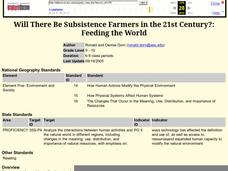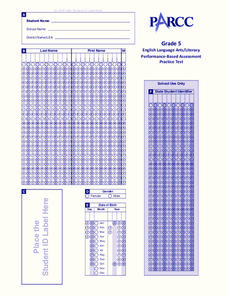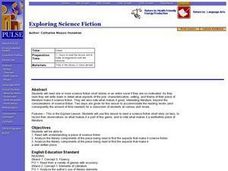University of North Carolina
Literature (Fiction)
An informative installment of the Writing for Specific Fields series helps readers learn how to interpret and write about fiction. The website details nine easy steps for writing a literary analysis—a useful method for all readers!
Curated OER
Reviewing Main Events in Fiction
Learners analyze elements of fiction while reading. In this reading analysis lesson, students read specific texts and retell the information they remember. Learners discover how sequential storytelling works.
Curated OER
Analyzing Irony in Nonfiction
Students examine the use of irony in non-fiction works. In this literature lesson, students read non-fiction war texts and explore the use of irony in the piece as they respond to discussion questions.
Curated OER
The News Behind the Story
What a fun way to analyze plot, setting, and character. Learners review story elements, read a short fictional story, then turn the events of that story into a headlining news paper article. Not only does this lesson plan engage critical...
Curated OER
Introducing Jane Eyre
"How can a magazine reflect a particular time and culture?" Using this prompt, your class explores the Victorian Era as it relates to Charlotte Bronte's Jane Eyre. They can also play the "Victorian Women's Rights" game for the year 1840...
Curated OER
The Time Machine
Challenge your class with this lesson! Learners read The Time Machine by H.G. Wells, discuss context clues, identify main ideas and details, and analyze story elements. Discussion questions and activities are broken down for each chapter...
Curated OER
Different Strokes For Different Folktales
Young readers use graphic organizers, such as Venn diagrams and story maps, to analyze a variety of folktales and the elements of a story. They use writing, sequencing activities, and creative art to identify the morals learned from a...
Curated OER
When I Set My Hat at a Certain Angle: Trying on Zora Neale Hurston's Voice to Dress-up Prose
After reading and evaluating examples of prose nonfiction by Zora Neale Hurston and other authors, high schoolers write a personal reflective essay rich in figurative language. By incorporating this strategy, they utilize voice within...
Curated OER
Analyzing the Use of Irony in a Short Story
Ninth graders examine how literature connects to real-life and see how irony aids in the development of theme. They read Shirley Jackson's The Lottery, and discuss elements of foreshadowing and situational irony. Then learners will write...
Curated OER
Will There Be Subsistence Farmers in the 21st Century?: Feeding the World
Students examine the topic of subsistence farming. They research the future of subsistence agriculture, identify the types and locations of subsistence agriculture, and write about subsistence farming in regards to developing nations and...
Syracuse City School District
Reading Comprehension Unit Plan
A unit plan uses short texts to teach literary elements such as theme and characterization. Included are passages by authors such as Walter Dean Myers and Sandra Cisneros. Activities include quick writes, filling in graphic organizers,...
2012 Teaching Resources
Analyzing Character Traits
Character analysis becomes easy with a 24-page packet packed with mini-lessons, graphic organizers, and activities. A must-have for your curriculum library.
Curated OER
Comparing and Contrasting Fiction and Nonfiction Using Graphic Organizers
Students compare and contrast fiction and non-fiction selections. In this writing skills lesson, students use different forms of graphic organizers to compare "The Three Little Pigs," to Wiesel's Night.
Curated OER
The Purpose and Power of Persuasion
Examine the power of persuasion and have learners consider how it influences events in their own lives. After reading and analyzing informational texts to understand the author's purpose, class members take a written test and craft a...
Syracuse City School District
Literary Elements
Address the literary elements in a piece of writing using these materials. The packet includes plenty of resources, and focuses mainly on theme, character, and point of view, with some materials for setting, symbolism, and author's...
Carnegie Library
Creative Writing: Middle School Lesson Plan
Enhance a unit on historical fiction with an engaging writing lesson. Learners bring the Industrial Era to life as they compose their own historical fiction pieces based on primary source images of Pittsburgh steel workers.
Curated OER
Performance-Based Assessment Practice Test (Grade 4 ELA/Literacy)
Track the progress of your fourth graders' reading and writing skills with this practice Common Core assessment. Based on a collection of six reading passages that include narrative stories, poetry, and a series of informational...
Curated OER
Performance-Based Assessment Practice Test (Grade 5 ELA/Literacy)
Check in on the development of your fifth graders' reading and writing skills with this Common Core-designed assessment. Given a series of six reading passages ranging from narrative stories to informational texts, young learners answer...
Administrative Office of the US Courts
Hazelwood v. Kuhlmeier
Freedom of speech is not always free. Scholars investigate how the First Amendment provides for the right to express opinions. Through the court case Hazelwood v. Kuhlmeier, they analyze free speech using primary documents—and hopefully...
Curated OER
Exploring Science Fiction
Twelfth graders read a variety of science fiction short stories. Using the text, they identify the components that make it science fiction and a well written piece of literature. They record their observations and share them with the...
Curated OER
Identifying Science Fiction
High schoolers discuss works of science fiction that they read, highlight aspects that made each a part of science fiction genre, identify formal literary elements, and discuss ways each can be developed through science fiction.
Curated OER
Pic-A-Fic: Choosing Fiction for Every Taste
Sixth graders examine and categorize a selection of title representing fiction genres. In this fiction genres lesson, 6th graders analyze and identify a variety of titles in the fiction genre. Students then find these types of fiction...
Curated OER
Learning to Analyze Characters
Learners discover writing strategies authors use to enhance characters. In this character writing instructional activity, students are read the Knuffle Bunny books by Mo Willems and analyze the story, characters and settings as they...
Curated OER
Introduction To Literary Analysis
Explore the fascinating ways in which authors use specific literary devices to create interesting and realistic texts. Using non-fiction articles with the subject of rogue waves, an excerpt from The Perfect Storm, by Sebastian Junger,...

























